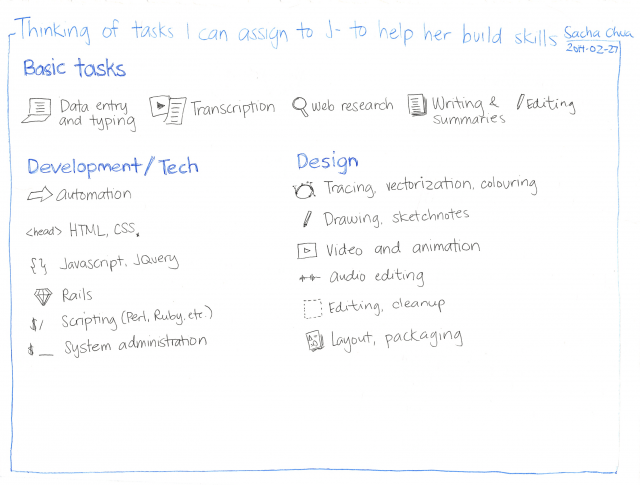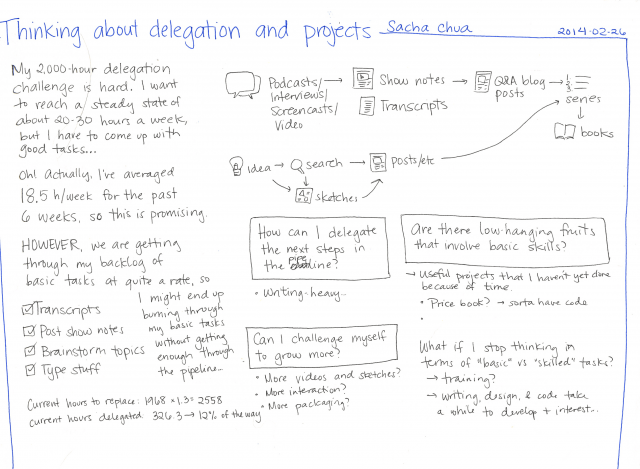Delegation update
Posted: - Modified: | delegationSince February 17, 2012 (the beginning of my experiment with self-directed work):
- 1,976 hours spent earning by working on other people's stuff – time I want to buy back
- 300 hours delegated through oDesk
- $50 spent delegating outside oDesk (so let's say that's ~4 hours)
- 87 hours managing delegation (started tracking in October) – includes interviewing, documenting processes, giving feedback
I was at a 1 hour managed : 4 hours worked ratio when I started, but I've been spending a lot more time documenting processes and training people. It's now at about 1:3.5. I think it will be worth it later on.
One of the questions I ask in order to push myself to delegate more is:
If I had spent the last two years focused on making my own things happen instead of working on interesting client projects part-time, what should I have accomplished already?
Similarly: What outcomes do I want to work on? If I work on other things, how can I fill in the gaps? For example, a visual guide to Emacs is eminently doable in two years of focused work. Ditto a more organized blog posts, lots of packaged PDFs and e-books, maybe even a paper book or two – and there are projects beyond those, and even more beyond those. I can't do much to affect my lifespan, but I can learn how to make up for those hours.
Things I'm learning
I like this system of adding lots of tasks to my Trello board and leaving it up to my assistants to choose the tasks and workload they want. That way, I don't have to feel guilty about underloading or overloading people, and they can choose things they're interested in. I'm experimenting with different ways to share resources, too – Dropbox, Google Drive, Trello attachments…
I'm building up a respectable process library. There are, of course, small bugs in the instructions I write (sigh!), but every run makes things better. Feel free to build on what I've shared.
This week, I trusted someone with my Google account, and the world did not end. This is promising.
Things to improve
I want to make sure there are plenty of tasks in the pipeline so that people can build up their skills and fill up their workload. It's a little challenging because I have to think and plan. The more types of tasks I identify and document, the easier it is to recognize delegation opportunities.
This probably means I need to make sure my assistants know how to read the due dates and filter Trello for tasks they're interested in (task assigned!). Maybe at some point I'll consider moving to something more structured. I remember liking Redmine. Hmm, it might be interesting to get stats on the kinds of tasks that end up languishing in the list and why. If I get this working smoothly, I should have just enough backlog to accommodate bursts of work, so I shouldn't have a really long list. Hmm…
I want to fill in more process gaps so that things move towards completion. I don't want to be the bottleneck. There's little point in delegating a task if I'm going to sit on the results. I want to prioritize tasks whose deliverables don't require a lot of extra work from me. It may mean writing tasks so that their outcomes can be published and shared easily (working out loud), and keeping track of what additional work can be done to push it forward. I really like the way that the podcast process has gotten condensed to just “Post show notes,” although transcripts are still a separate step at the moment. I'd like to get to that level of abstraction with other processes, while still being able to break it down into lower levels of abstraction in case I'm training an assistant with less experience.
On a related note, I want to show the big pictures for skill building. I want my assistants to be able to confidently justify higher rates for me and other employers. Oh! Maybe I can draw those process maps and find out where my assistants are in terms of skills. They can tell me what they're interested in, and we can map out sequences of tasks to help them grow. This helps me grow, too.
So, what's next for me?
- Slant my tasks towards publishing. Share intermediate results, keep track of the next steps and the big goals.
- Show the big picture in terms of processes and skills. Fill in the gaps.
Getting the hang of this!



2 comments
Rémi Letot
2014-03-10T10:50:12ZHello,
if you're leaning to redmine, don't forget this interresting possibility:
http://orgmode.org/worg/org...
Probably not useable as is, since org evolved quite a bit since this was published. But it does have a redmine backend, and who knows what a good elisp hacker could make of such a nice foundation :-)
sachac
2014-03-22T02:30:39ZSo far, Trello seems to be holding up. =) My assistants are going through the tasks pretty quickly and seem to have figured out filters/notification, so I can probably get by with that instead of redmine. Thanks for the suggestion, though!